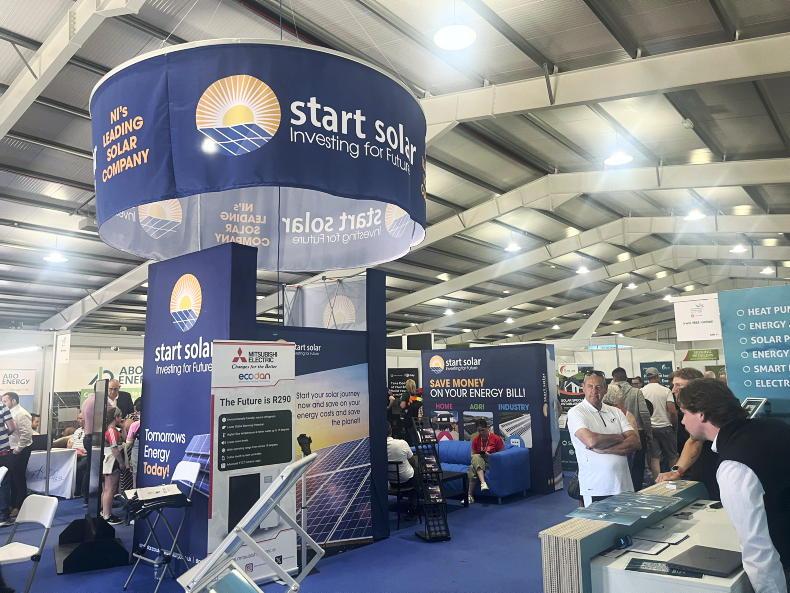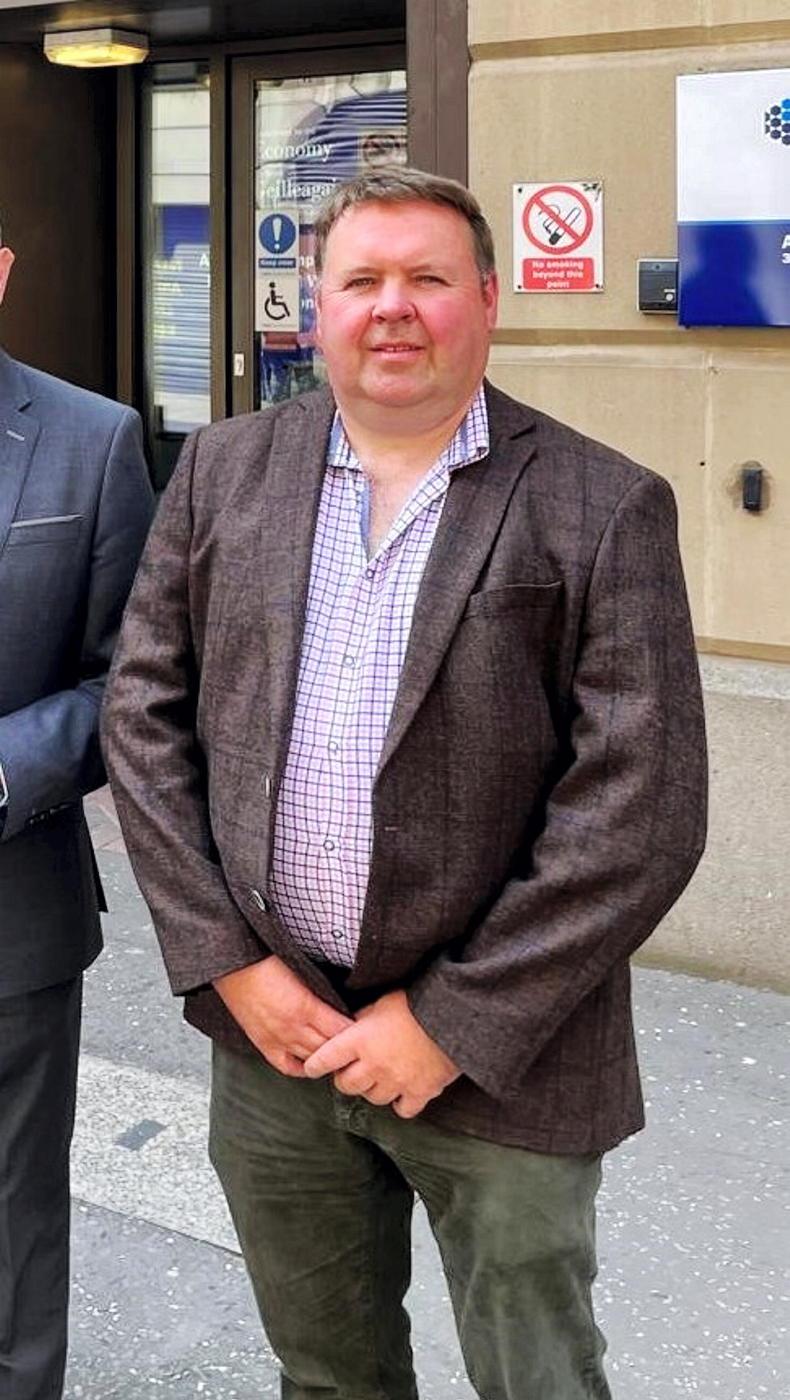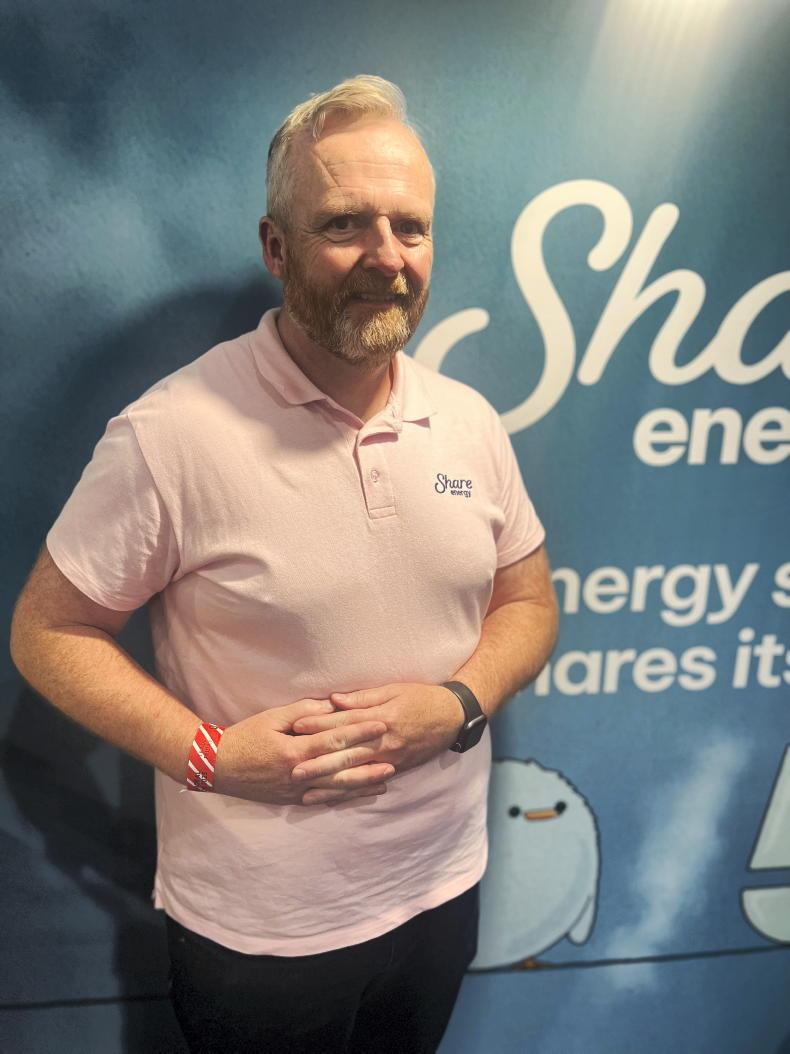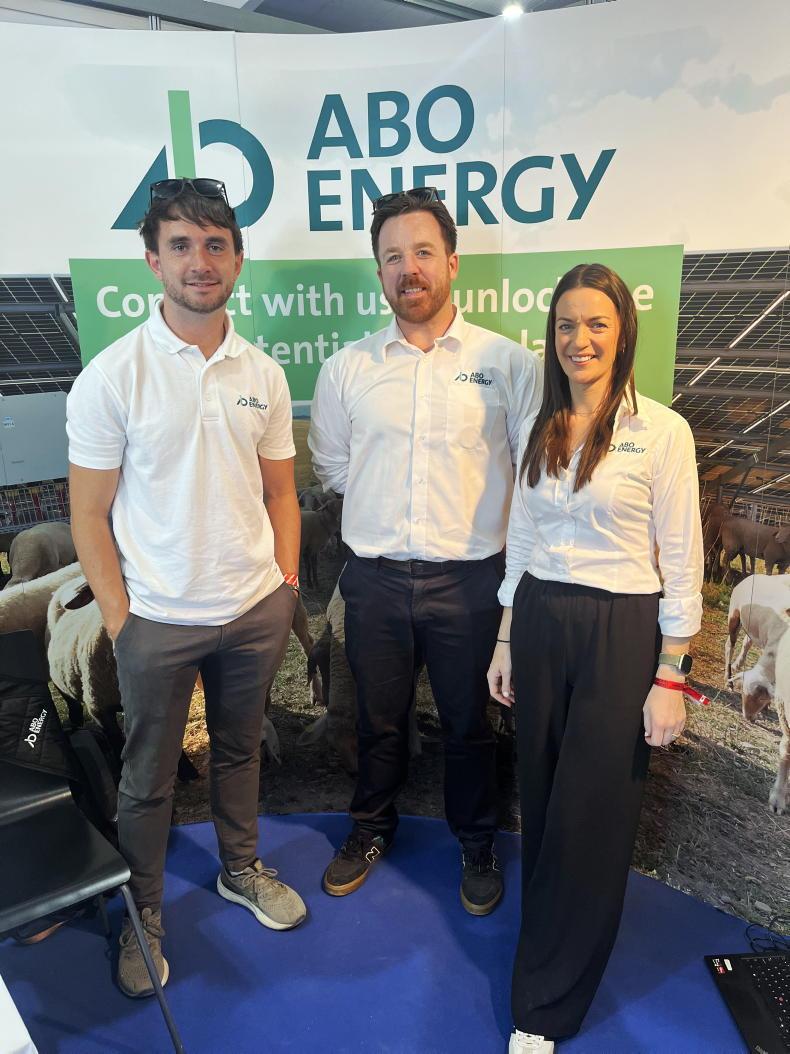Amid the crowds and cattle, this year’s Balmoral Show featured a strong renewable energy presence, both in its dedicated Sustainability Village tent and scattered throughout the wider showgrounds.
Northern Ireland has long been a pioneer in farm-based renewable energy, having developed successful electricity schemes that allowed farmers to diversify into wind, hydro, solar and anaerobic digestion.
“In some cases, being able to install a wind turbine made the difference between a son or daughter returning home to farm, or not,” explained UFU rural enterprise chair John Watt, who we caught up with at the show.
However, in the absence of new schemes, new projects are limited to using renewables to only meet a farm’s energy needs, he said. He explained that the process and cost of connecting to the electricity grid has made some projects unviable, and there is a pressing need for a new energy strategy for Northern Ireland.
“The push seems to be on for offshore wind,” he added.
There is also growing concern among farmers about what will happen after the flagship Northern Ireland Renewables Obligation (NIRO) comes to an end.
While a well-maintained wind turbine could still secure a lower-value power purchase agreement and remain operational, anaerobic digestion plants may no longer be viable due to high running costs.
So far, little information has been provided to the UFU about the government’s plans post-NIRO, John said.
Solar PV
The fallout from the botched Renewable Heat Incentive scheme continues to cast a long shadow on new renewables schemes. This may explain the reluctance to introduce grants for solar PV for farmers, unlike the support available in the Republic of Ireland. Stephen Galwey, energy and renewables lead at Irwin M&E, said there remains a degree of hesitation among some Northern Irish farmers to invest in solar PV, mostly due to the lack of grants or government incentives.
It is high-energy-use farms that are driving uptake, with some investing in solar without subsidies and still seeing payback periods of four to six years. This is fairly reasonable considering the absence of grants, he said.
His comments were echoed by Paul Watson, business development manager at Alternative Energy, who highlighted the stark contrast between Northern Ireland and the Republic of Ireland.
While grants of up to 50% for solar are available through Invest NI and the Department for the Economy, they had been paused at the time of the Balmoral Show. Even when active, these schemes exclude farmers, which solar PV suppliers say is difficult to understand. As in the Republic of Ireland, grid access remains a major barrier. Capacity is severely limited in some areas, and the NIE Networks connection process, known as G98 for smaller systems and G99 for larger ones, is lengthy and often delayed.
In some cases, farmers are granted connections with zero export capacity, meaning they cannot be paid for surplus electricity.
Where export is permitted, farmers typically receive around 10 pence per kilowatt hour (12 cents per kilowatt hour) for the electricity they feed into the grid.

The sustainability village at this year's show.
Microgrid
Grid challenges were a major theme in the sustainability tent. Stuart Lunn, sales director at Lugh Microgrid, explained that the company’s microgrid system was developed to address these issues.
Installed on farms in Northern Ireland facing grid constraints, the system allows farmers to connect more renewable generators than their grid connection would typically permit, matching generation with the farm’s actual energy demand.
In effect, it acts as a buffer between the grid and the farm. The Northern Ireland-based company is now exporting the system globally.
Profit share electricity provider
Derry-born entrepreneur Damian Wilson is behind a new, innovative energy product in the market. His company, Share Energy, gives customers a share of the profits made on the electricity they purchase.
At the end of each year, any profit the company makes is split 50:50 between Share Energy and its customers, based on how much electricity each customer has used. Speaking with Damian, he explained that these payments will be made each July, either as an energy credit or a direct bank transfer.
Having co-owned energy companies in the past, Damian founded Share Energy with the goal of doing things differently.
“No other company is doing this in the UK,” he said. Now seven months into business in Northern Ireland, Share Energy has signed up over 10,000 customers and that number is continuing to grow.
Asked about pricing, Damian said his aim is to offer the most competitive electricity rates possible, while still making a margin. The company also buys electricity from generators across Northern Ireland and is open to offering contracts to local suppliers. Damian plans to expand into the Republic of Ireland next year.
Interest from horticulture
At the show, there was great interest from horticulture producers in the Republic of Ireland in wind turbines. Rengineers supply turbine maintenance services to the island of Ireland but also supply the BestWatt wind turbines. Sales rep Matt Porter said they were surprised by the interest that came from horticulture producers in wind in particular, and put it down to potential grant aid for systems.
Erwin Bleijenberg explained that the 10kW wind turbine with a 5m blade which they had on display cost around €80,000 and is targeted at farmers to produce their own electricity and reduce imports.
Land wanted for renewables
The search for land for solar, battery, wind and hydrogen projects was in full swing at this year’s Balmoral Show.
Alice Murphy, development project manager with international developers ABO Energy, said they attended the event to engage with interested landowners and farmers, and interest was high she noted.
While Northern Ireland does not yet have a support scheme for large-scale renewable projects like the Republic of Ireland, ABO Energy is looking to develop sites based on power purchase agreements (PPAs).
The company offers farmers 20–35 year leases, with payments made on a per-megawatt (MW) basis, rather than the per-acre model used in the Republic.
Biomethane
While anaerobic digestion is seen as part of the solution to Northern Ireland’s nutrient challenge, there remains a lack of substantial policy development outlining how biomethane production will be supported.

UFU rural enterprise chair John Watt.

Damian Wilson, Share Energy.

Stephen Galwey, energy and renewables lead at Irwin M&E.

From left, Stephen Mc Nicholl, Stephen mcCarron and Alice Murphy, with ABO Energy.
Amid the crowds and cattle, this year’s Balmoral Show featured a strong renewable energy presence, both in its dedicated Sustainability Village tent and scattered throughout the wider showgrounds.
Northern Ireland has long been a pioneer in farm-based renewable energy, having developed successful electricity schemes that allowed farmers to diversify into wind, hydro, solar and anaerobic digestion.
“In some cases, being able to install a wind turbine made the difference between a son or daughter returning home to farm, or not,” explained UFU rural enterprise chair John Watt, who we caught up with at the show.
However, in the absence of new schemes, new projects are limited to using renewables to only meet a farm’s energy needs, he said. He explained that the process and cost of connecting to the electricity grid has made some projects unviable, and there is a pressing need for a new energy strategy for Northern Ireland.
“The push seems to be on for offshore wind,” he added.
There is also growing concern among farmers about what will happen after the flagship Northern Ireland Renewables Obligation (NIRO) comes to an end.
While a well-maintained wind turbine could still secure a lower-value power purchase agreement and remain operational, anaerobic digestion plants may no longer be viable due to high running costs.
So far, little information has been provided to the UFU about the government’s plans post-NIRO, John said.
Solar PV
The fallout from the botched Renewable Heat Incentive scheme continues to cast a long shadow on new renewables schemes. This may explain the reluctance to introduce grants for solar PV for farmers, unlike the support available in the Republic of Ireland. Stephen Galwey, energy and renewables lead at Irwin M&E, said there remains a degree of hesitation among some Northern Irish farmers to invest in solar PV, mostly due to the lack of grants or government incentives.
It is high-energy-use farms that are driving uptake, with some investing in solar without subsidies and still seeing payback periods of four to six years. This is fairly reasonable considering the absence of grants, he said.
His comments were echoed by Paul Watson, business development manager at Alternative Energy, who highlighted the stark contrast between Northern Ireland and the Republic of Ireland.
While grants of up to 50% for solar are available through Invest NI and the Department for the Economy, they had been paused at the time of the Balmoral Show. Even when active, these schemes exclude farmers, which solar PV suppliers say is difficult to understand. As in the Republic of Ireland, grid access remains a major barrier. Capacity is severely limited in some areas, and the NIE Networks connection process, known as G98 for smaller systems and G99 for larger ones, is lengthy and often delayed.
In some cases, farmers are granted connections with zero export capacity, meaning they cannot be paid for surplus electricity.
Where export is permitted, farmers typically receive around 10 pence per kilowatt hour (12 cents per kilowatt hour) for the electricity they feed into the grid.

The sustainability village at this year's show.
Microgrid
Grid challenges were a major theme in the sustainability tent. Stuart Lunn, sales director at Lugh Microgrid, explained that the company’s microgrid system was developed to address these issues.
Installed on farms in Northern Ireland facing grid constraints, the system allows farmers to connect more renewable generators than their grid connection would typically permit, matching generation with the farm’s actual energy demand.
In effect, it acts as a buffer between the grid and the farm. The Northern Ireland-based company is now exporting the system globally.
Profit share electricity provider
Derry-born entrepreneur Damian Wilson is behind a new, innovative energy product in the market. His company, Share Energy, gives customers a share of the profits made on the electricity they purchase.
At the end of each year, any profit the company makes is split 50:50 between Share Energy and its customers, based on how much electricity each customer has used. Speaking with Damian, he explained that these payments will be made each July, either as an energy credit or a direct bank transfer.
Having co-owned energy companies in the past, Damian founded Share Energy with the goal of doing things differently.
“No other company is doing this in the UK,” he said. Now seven months into business in Northern Ireland, Share Energy has signed up over 10,000 customers and that number is continuing to grow.
Asked about pricing, Damian said his aim is to offer the most competitive electricity rates possible, while still making a margin. The company also buys electricity from generators across Northern Ireland and is open to offering contracts to local suppliers. Damian plans to expand into the Republic of Ireland next year.
Interest from horticulture
At the show, there was great interest from horticulture producers in the Republic of Ireland in wind turbines. Rengineers supply turbine maintenance services to the island of Ireland but also supply the BestWatt wind turbines. Sales rep Matt Porter said they were surprised by the interest that came from horticulture producers in wind in particular, and put it down to potential grant aid for systems.
Erwin Bleijenberg explained that the 10kW wind turbine with a 5m blade which they had on display cost around €80,000 and is targeted at farmers to produce their own electricity and reduce imports.
Land wanted for renewables
The search for land for solar, battery, wind and hydrogen projects was in full swing at this year’s Balmoral Show.
Alice Murphy, development project manager with international developers ABO Energy, said they attended the event to engage with interested landowners and farmers, and interest was high she noted.
While Northern Ireland does not yet have a support scheme for large-scale renewable projects like the Republic of Ireland, ABO Energy is looking to develop sites based on power purchase agreements (PPAs).
The company offers farmers 20–35 year leases, with payments made on a per-megawatt (MW) basis, rather than the per-acre model used in the Republic.
Biomethane
While anaerobic digestion is seen as part of the solution to Northern Ireland’s nutrient challenge, there remains a lack of substantial policy development outlining how biomethane production will be supported.

UFU rural enterprise chair John Watt.

Damian Wilson, Share Energy.

Stephen Galwey, energy and renewables lead at Irwin M&E.

From left, Stephen Mc Nicholl, Stephen mcCarron and Alice Murphy, with ABO Energy.














SHARING OPTIONS